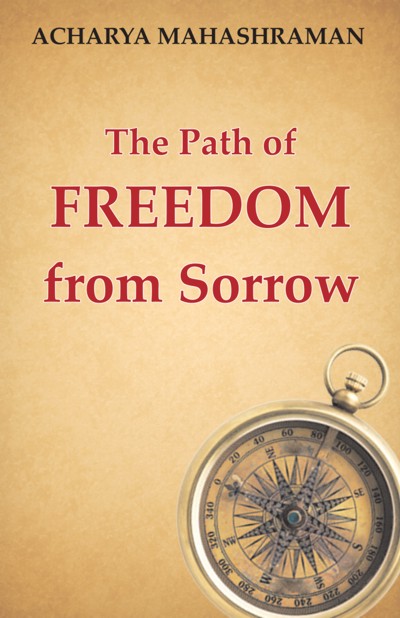A very important verse from the Jain Agam is:
Je yavi chande maiiddhigarave, piśhune nare sahas heenapesane aditthadhamme vinae dkovie, asamvibhagi na hu tass mokkho
This verse from Dasvealiyam Agam explains eight things, which are obstacles to liberation or a pain-free life.
1. Brutality
The first is chande (ferociousness). One who acts with cruelty repeatedly and who is complex by nature, will find the attainment of freedom from misery challenging. A spiritual person should not be brutal. In other words, he should not have ferocity and hatred in his behaviour. There should be softness in behaviour. Not just an ascetic, but also noble man is expected to maintain his decent, calm and beautiful attitude. Many times Acharya Mahapragya would say and it is my personal experience too that the natural behaviour is humbleness. There are times when a strict behaviour becomes necessary. Wherever there is humbleness and softness there is a pull towards that person. On the other hand, wherever hardness and brutality co-exists, attraction towards other people ceases. A serene person brings peace into others' lives and people are drawn towards him. An aggressive person disrupts his own peace and others' as well. The following saying in the Agam highlights the significance of peace:
je ya buddha aikkanta, Je ya buddha anagaya santi tesim paitthanam, Bhuyanam jagai jaha.
It explains that the basis of the past, the future and the present arhat (tirthankar) is shanti (absence of kashay), just as the earth is the basis for all living beings. As the earth is our pedestal, human beings are stable on earth with peace, as is the wisdom and complete knowledge (keval gyan) of omniscient people. Without absence of kashay, complete knowledge is not possible. Right faith (samyak darshan) is also based upon absence of kashay to some extent. In the presence of kashay, right faith is not possible. A householder, a monk, and an omniscient all require absence of kashay. To be endowed with shanti (absence of kashay) or to attain liberation, the development of a humble attitude is a must, and the brutal behaviour should be given up.
2. Ego
The second impediment is mai-iddhigarave (ego for intelligence and prosperity). An egoist person cannot be free from sorrow. It is never right to have an ego for anything be it wealth, knowledge, or power. Usually i give three suggestions to wealthy people.
- Do not have ego for wealth.
- Do not get over attached to wealth. Have the attitude of giving up.
- Never misuse wealth
In addition, I have three suggestions for knowledgeable people
- Recognize your ignorance and try to eradicate it.
- Try to share your knowledge.
- Apply your intellect to spiritual and advanced knowledge.
The person who have knowledge of the self does not have ego. Man should not have ego for his knowledge and prosperity. An egotistical person invites pain whereas the ego-free person attains peace.
3. Slander
The third obstacle is pisune nare (backbiting or slandering another person). A backbiter prepares the ground for pain. Backbiting is a bad attitude. It is a sin. The one who aims on finding fault in others can never get salvation. A Sanskrit poet metaphorically has compared such people with mosquito.
Prak padayoh patati khadati prishthamansam karne kalau kimapi roti shanaih vichitram chhidram nirupya sahasa pravishatyashankah sarvam khalasy charitam mashakah karoti
First of all mosquito tumbles on the feet, then bites the flesh of the back. Slowly, makes a sweet but weird sound in the ear. After observing the hole (in the ear) securely enters inside. In this way mosquito behaves wickedly. A backbiter also behaves similar to a mosquito. One can be free from misery if he quits backbiting.
4. Recklessness
The forth obstacle is sahas (recklessness). A reckless person who acts without thinking cannot be free of sorrow. If in any situation, decisions are being taken without rational thinking then many times undesirable and unfavourable can happen.
Once, a prince had to travel out of his kingdom. After twelve years he returned to his land without any notice. In the night time he came to his palace with his attendants. As soon as he entered his room, he saw a man sleeping next to his wife. This scene made the prince extremely furious and he planned to kill both of them at that very moment with his sword. Instantly, one maxim emerged into his head from his childhood:
sahas vidadhit na kriyamavivekah parmapadam padam vrinute hi vimrishyakarinam gunlubdhah svayamev sampadah
Any act should not be performed instantly without rational thinking. Imprudence is haven of all the problems. While any deliberate act brings happiness. After recollecting this maxim prince awakened his wife and asked, "Who is sleeping with you?"
Wife replied, "My lord! He is your son. When you went from here he was in the womb and today he is 12 years old."
Prince thought, "A devastating act would have been done today. Without thinking if I would have attacked with sword, then both my wife and son would have died. My family would have been ruined." Therefore, very truly it is said in agam that a person who acts without thinking invites distress.
5. Lack of discipline
The fifth obstacle is heenapesane (lack of discipline). An undisciplined person, who does not listen to his master and seniors and is defiant, creates suffering for himself. On the other hand a modest person, who is humble enough to respect those with experience and seniority, feels joy in his life. The current generation needs to analyse that it is obedient or not. The one who acts upon the words is obedience and the one who defies is disobedient.
In Sanskrit literature even it is said:
'agya gurunam avicharaniyam'
The order, given by Guru does not require second thought. They should be obeyed instantly and without question. Obedience is the path of joy, whereas disobedience is the path of sorrow.
6. Faithlessness
The sixth obstacle is adittha-dhamme (ignorance about religion). The one who does not abide by religion brings sorrow for himself. Siddhraj Jaysingh, the king of Gujarat, once said to Acharya Hemachandra, 'it is very difficult to understand the deep form of religion, therefore please make me understand the path of simple religion?'
Acharya Hemachandra elucidated the simple religion through Sanskrit verse as
Patre danam gurushu vinayah sarvasatvanukampa Nyayyah vrittih parahitavidyavadarah sarvakalam Karyo na shrimadaparichayah sangatih satsu samyag Rajan! sevyo vishadmatina saish samanyadharmah.
i.e. The simple nature of religion is to give offerings to a worthy person, to be modest to your guru, have compassion towards all living beings, to have a judicious attitude, to think of the well-being of others, not to have ego for wealth and to keep the company of noble people. People with serene minds should follow it.
Renunciation is religion and consumption is vice. Restraint is religion, non-restraint is vice. Religion is priceless. Religion cannot be bought at any price. By understanding the religion, man should quit vices, intoxicants, anger and dishonesty. After understanding religion and by giving up sins one can get rid of misery. A non-religious person makes the ground ready for sorrow.
7. Arrogance
The seventh obstacle is vinae akovie (arrogance, lacking humility). The one, who is not humble, does not bow, does not respect elders, and does not give up his persistence, feels distress. Therefore, man should be an expert in modesty. Practising humbleness can bring welfare for the soul. Acharya Nemichandra has a verse mentioned in Sukhabodha:
Vinaya nanant nanao, dasanam dansanao charanam cha Charnehinto mokkho,mokkhe sokkham nirabaham
Practicing modesty gives knowledge, knowledge gives faith, faith gives conduct and conduct gives liberation. And, incessant bliss is experienced in salvation.
8. Non-sharing Attitude
The eighth obstacle is asamvibhagi (avarice or Non-sharing attitude). Man who does not have an attitude of sharing goes through sufferings. It gives rise to conflict if a man wants to snatch other's share while living in the society. A person with such attitude says, 'mine is mine, and yours is also mine!' Conversely, a benevolent person says, 'yours is yours, mine is also yours!' While a saint says, 'nothing is yours, and nothing is mine. World is like a guest house. Everyone have to left it.'
A man who has mastered sharing, forsaking, and relinquishing can become free from sufferings. But the miserly person cannot achieve happiness.
Many monks were living with Muni Swaroop Chandaji. One day they got less water in alms. So, muni instructed other monks, 'today we have shortage of water. Therefore, take a bowl of water only' Almost all the monks followed his instruction consciously. But a monk, Otoji, without thinking of the measure of a bowl took water in patra (big bowl). Muni Swaroop Chandaji asked him, 'why did you break the rules? Why did you take water without quantifying with bowl?' Otoji replied, 'how can water be taken with measurement. I was thirsty. And if I took more water, then what is wrong here?' Muni Shree explained, 'look! Normally it is not necessary to measure the water. But today there is a shortage of water. Distribution is our predefined system. You have defied the management.' As a consequence of transgressing the discipline and management or not having an attitude of sharing he was dispersed from the order.
In nut shell, the person who does not get angry frequently, does not have ego for knowledge and prosperity, does not do backbiting, does not act without thinking, is disciplined, understands the religion, skilled in modesty and have the attitude of sharing, can be free from misery and can attain liberation.
 Acharya Mahashraman
Acharya Mahashraman
